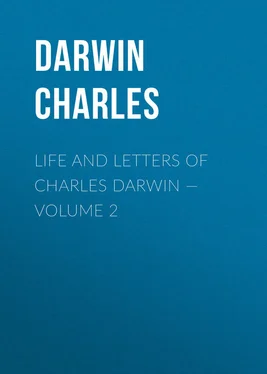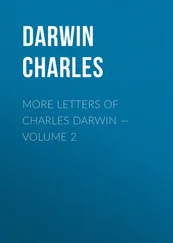Charles Darwin - Life and Letters of Charles Darwin — Volume 2
Здесь есть возможность читать онлайн «Charles Darwin - Life and Letters of Charles Darwin — Volume 2» — ознакомительный отрывок электронной книги совершенно бесплатно, а после прочтения отрывка купить полную версию. В некоторых случаях можно слушать аудио, скачать через торрент в формате fb2 и присутствует краткое содержание. Жанр: foreign_antique, foreign_prose, на английском языке. Описание произведения, (предисловие) а так же отзывы посетителей доступны на портале библиотеки ЛибКат.
- Название:Life and Letters of Charles Darwin — Volume 2
- Автор:
- Жанр:
- Год:неизвестен
- ISBN:нет данных
- Рейтинг книги:3 / 5. Голосов: 1
-
Избранное:Добавить в избранное
- Отзывы:
-
Ваша оценка:
- 60
- 1
- 2
- 3
- 4
- 5
Life and Letters of Charles Darwin — Volume 2: краткое содержание, описание и аннотация
Предлагаем к чтению аннотацию, описание, краткое содержание или предисловие (зависит от того, что написал сам автор книги «Life and Letters of Charles Darwin — Volume 2»). Если вы не нашли необходимую информацию о книге — напишите в комментариях, мы постараемся отыскать её.
Life and Letters of Charles Darwin — Volume 2 — читать онлайн ознакомительный отрывок
Ниже представлен текст книги, разбитый по страницам. Система сохранения места последней прочитанной страницы, позволяет с удобством читать онлайн бесплатно книгу «Life and Letters of Charles Darwin — Volume 2», без необходимости каждый раз заново искать на чём Вы остановились. Поставьте закладку, и сможете в любой момент перейти на страницу, на которой закончили чтение.
Интервал:
Закладка:
"His views on this subject were very much to the same effect from his side. Of course any conversations we may have had on purely religious subjects are as sacredly private now as in his life; but the quaint conclusion of one may be given. We had been speaking of the apparent contradiction of some supposed discoveries with the Book of Genesis; he said, 'you are (it would have been more correct to say you ought to be) a theologian, I am a naturalist, the lines are separate. I endeavour to discover facts without considering what is said in the Book of Genesis. I do not attack Moses, and I think Moses can take care of himself.' To the same effect he wrote more recently, 'I cannot remember that I ever published a word directly against religion or the clergy; but if you were to read a little pamphlet which I received a couple of days ago by a clergyman, you would laugh, and admit that I had some excuse for bitterness. After abusing me for two or three pages, in language sufficiently plain and emphatic to have satisfied any reasonable man, he sums up by saying that he has vainly searched the English language to find terms to express his contempt for me and all Darwinians.' In another letter, after I had left Down, he writes, 'We often differed, but you are one of those rare mortals from whom one can differ and yet feel no shade of animosity, and that is a thing [of] which I should feel very proud, if any one could say [it] of me.'
"On my last visit to Down, Mr. Darwin said, at his dinner-table, 'Brodie Innes and I have been fast friends for thirty years, and we never thoroughly agreed on any subject but once, and then we stared hard at each other, and thought one of us must be very ill.'"]
CHARLES DARWIN TO C. LYELL. Down, February 23rd [1860].
My dear Lyell,
That is a splendid answer of the father of Judge Crompton. How curious that the Judge should have hit on exactly the same points as yourself. It shows me what a capital lawyer you would have made, how many unjust acts you would have made appear just! But how much grander a field has science been than the law, though the latter might have made you Lord Kinnordy. I will, if there be another edition, enlarge on gradation in the eye, and on all forms coming from one prototype, so as to try and make both less glaringly improbable...
With respect to Bronn's objection that it cannot be shown how life arises, and likewise to a certain extent Asa Gray's remark that natural selection is not a vera causa, I was much interested by finding accidentally in Brewster's 'Life of Newton,' that Leibnitz objected to the law of gravity because Newton could not show what gravity itself is. As it has chanced, I have used in letters this very same argument, little knowing that any one had really thus objected to the law of gravity. Newton answers by saying that it is philosophy to make out the movements of a clock, though you do not know why the weight descends to the ground. Leibnitz further objected that the law of gravity was opposed to Natural Religion! Is this not curious? I really think I shall use the facts for some introductory remarks for my bigger book.
... You ask (I see) why we do not have monstrosities in higher animals; but when they live they are almost always sterile (even giants and dwarfs are GENERALLY sterile), and we do not know that Harvey's monster would have bred. There is I believe only one case on record of a peloric flower being fertile, and I cannot remember whether this reproduced itself.
To recur to the eye. I really think it would have been dishonest, not to have faced the difficulty; and worse (as Talleyrand would have said), it would have been impolitic I think, for it would have been thrown in my teeth, as H. Holland threw the bones of the ear, till Huxley shut him up by showing what a fine gradation occurred amongst living creatures.
I thank you much for your most pleasant letter.
Yours affectionately, C. DARWIN.
P.S. — I send a letter by Herbert Spencer, which you can read or not as you think fit. He puts, to my mind, the philosophy of the argument better than almost any one, at the close of the letter. I could make nothing of Dana's idealistic notions about species; but then, as Wollaston says, I have not a metaphysical head.
By the way, I have thrown at Wollaston's head, a paper by Alexander Jordan, who demonstrates metaphysically that all our cultivated races are Go-created species.
Wollaston misrepresents accidentally, to a wonderful extent, some passages in my book. He reviewed, without relooking at certain passages.
CHARLES DARWIN TO C. LYELL. Down, February 25th [1860].
... I cannot help wondering at your zeal about my book. I declare to heaven you seem to care as much about my book as I do myself. You have no right to be so eminently unselfish! I have taken off my spit [i.e. file] a letter of Ramsay's, as every geologist convert I think very important. By the way, I saw some time ago a letter from H.D. Rogers (Professor of Geology in the University of Glasgow. Born in the United States 1809, died 1866.) to Huxley, in which he goes very far with us...
CHARLES DARWIN TO J.D. HOOKER. Down, Saturday, March 3rd, [1860].
My dear Hooker,
What a day's work you had on that Thursday! I was not able to go to London till Monday, and then I was a fool for going, for, on Tuesday night, I had an attack of fever (with a touch of pleurisy), which came on like a lion, but went off as a lamb, but has shattered me a good bit.
I was much interested by your last note... I think you expect too much in regard to change of opinion on the subject of Species. One large class of men, more especially I suspect of naturalists, never will care about ANY general question, of which old Gray, of the British Museum, may be taken as a type; and secondly, nearly all men past a moderate age, either in actual years or in mind, are, I am fully convinced, incapable of looking at facts under a new point of view. Seriously, I am astonished and rejoiced at the progress which the subject has made; look at the enclosed memorandum. (See table of names below.) — says my book will be forgotten in ten years, perhaps so; but, with such a list, I feel convinced the subject will not. The outsiders, as you say, are strong.
You say that you think that Bentham is touched, "but, like a wise man, holds his tongue." Perhaps you only mean that he cannot decide, otherwise I should think such silence the reverse of magnanimity; for if others behaved the same way, how would opinion ever progress? It is a dereliction of actual duty. (In a subsequent letter to Sir J.D. Hooker (March 12th, 1860), my father wrote, "I now quite understand Bentham's silence.")
I am so glad to hear about Thwaites. (Dr. G.J.K. Thwaites, who was born in 1811, established a reputation in this country as an expert microscopist, and an acute observer, working especially at cryptogamic botany. On his appointment as Director of the Botanic Gardens at Peradenyia, Ceylon, Dr. Thwaites devoted himself to the flora of Ceylon. As a result of this he has left numerous and valuable collections, a description of which he embodied in his 'Enumeratio Plantarum Zeylaniae' (1864). Dr. Thwaites was a fellow of the Linnean Society, but beyond the above facts little seems to have been recorded of his life. His death occurred in Ceylon on September 11th, 1882, in his seventy-second year. "Athenaeum", October 14th, 1882, page 500.)... I have had an astounding letter from Dr. Boott (The letter is enthusiastically laudatory, and obviously full of genuine feeling.); it might be turned into ridicule against him and me, so I will not send it to any one. He writes in a noble spirit of love of truth.
I wonder what Lindley thinks; probably too busy to read or think on the question.
I am vexed about Bentham's reticence, for it would have been of real value to know what parts appeared weakest to a man of his powers of observation.
Читать дальшеИнтервал:
Закладка:
Похожие книги на «Life and Letters of Charles Darwin — Volume 2»
Представляем Вашему вниманию похожие книги на «Life and Letters of Charles Darwin — Volume 2» списком для выбора. Мы отобрали схожую по названию и смыслу литературу в надежде предоставить читателям больше вариантов отыскать новые, интересные, ещё непрочитанные произведения.
Обсуждение, отзывы о книге «Life and Letters of Charles Darwin — Volume 2» и просто собственные мнения читателей. Оставьте ваши комментарии, напишите, что Вы думаете о произведении, его смысле или главных героях. Укажите что конкретно понравилось, а что нет, и почему Вы так считаете.












